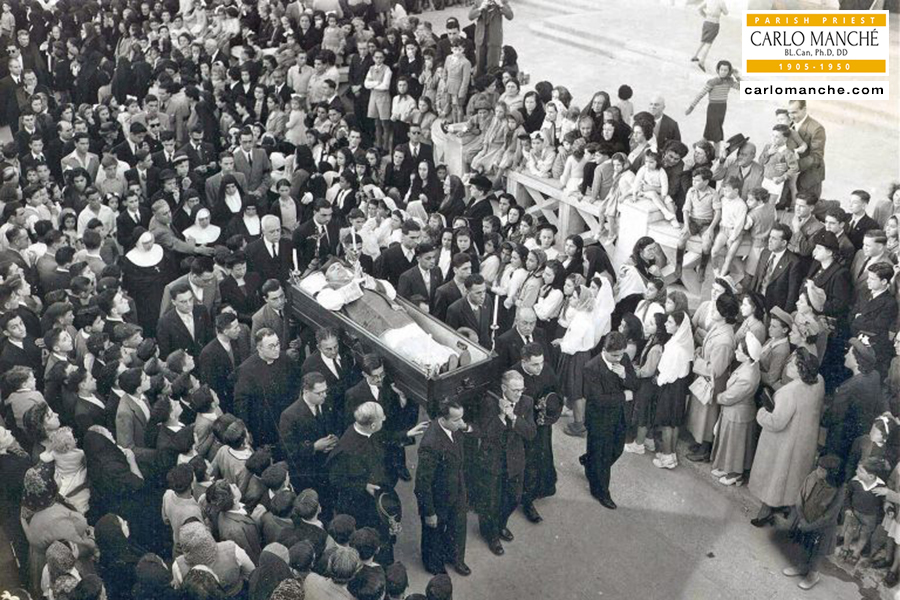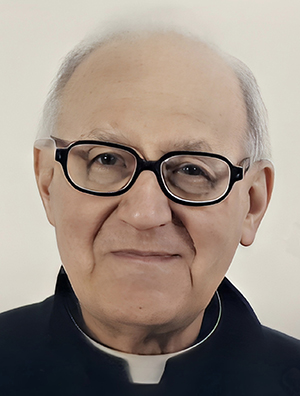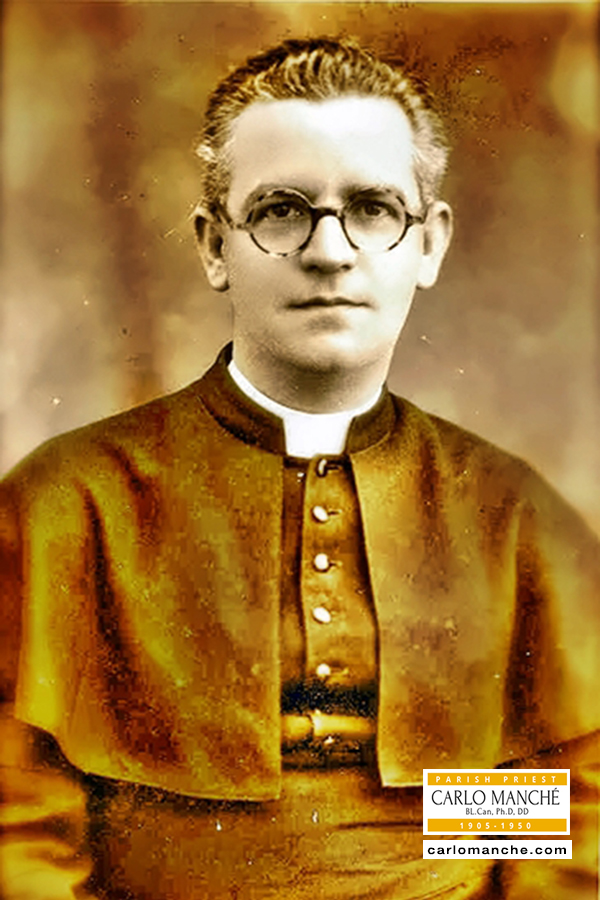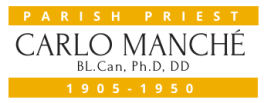Appreciation

Commemorating the 50th Anniversary of the death of Rev Carlo Manché
Homily by Rev Alfred Manché delivered at Gżira Parish Church on 17 November 2000

This evening I feel very embarrassed as I will be speaking about a member of my own family. I am feeling very much like the Latin saying: “Cicero pro Domo Sua” – “Cicero defending himself” or as the Maltese would say: “Bragging about one’s feathers”. On my part, however, I feel none of these sentiments. I will be speaking to you about what I know, from my little experience with Fr Carlo Manché, since when he died, I was only seventeen years old and had been already four years at the Seminary. I will interpret his life as a good priest, faithful, charitable, and hardworking in the apostolate.
First of all, listen to these few verses from the Book of Psalms:
- “Blessed be those who act with justice and abide by God’s law at all times.”
- “Blessed be the man who fears the Lord and finds great joy in His commandments.”
- “Blessed be the man who lives with integrity, obeying the law of the Lord.”
- “Blessed be he who is faithful to His teachings and seeks Him with all his heart.”
In the first reading from the Book of Wisdom we heard that: “Truly foolish by nature are those human beings who live without knowing God, and blinded with the riches, which they see with their eyes, fail to recognise Him, who created them. If, awed by their beauty, they considered them as gods, how much greater is the Lord as He Himself, the same author of beauty, has created them.”
His lack of attachment to beautiful things
The first thought about Father Carlo, which is linked to these excerpts, was the lack of attachment to beautiful objects and good things. To those who said to him: “Parish Priest, how beautiful this is,” he would immediately reply: “Do you like it? Take it.” Linked to this lack of attachment to objects was also his aversion to honours. Once, if I am not mistaken, during the setting up of the Musical Society, the people at the Band Club who were elated with the event, the feasibility of which had been studied for a long time to ensure that the Club is truly a place of formation — in fact, it was established as a branch of the Men’s Catholic Action group — several men came up to him and tried to lift him shoulder high. He resisted so much that about three ribs of his were dislocated. And I remember, Professor Craig, who lived at Ta’ Xbiex, came over and treated his back using a simple technique that consisted of wedging his knee in the middle of Fr Carlo’s back, pulling both his shoulders backwards and with a couple of bone clicks all was back in place.
His enthusiasm for the apostolate
His eagerness for the apostolate was obvious from his pastoral initiatives and activity. Let me first say that he kept abreast of church teaching. He used to buy and read the best theological authors of his time, for example: Henri De Lubac. The weekly catechism in the church, a holy duty of the parish priest, was taught at three in the afternoon for children and at five for adults. It wasn’t the first time that mum took me with her so that I was not left alone at home, and I used to end up falling asleep with my head resting on her shoulder.
Catechism was tied to discipline
Attendance at children’s catechism on Sundays was required for the fulfilment of the Easter duties. Every Sunday we were given a brown round card, on which the word ‘GŻIRA’ was printed. Whoever of the children did not have the required number of round cards needed at the time of blessing of homes (when families were given white ‘Buluttin’ cards, one per person), would be left without a ‘Buluttin’ card, and thus without fulfilling the Easter duties.
We used to be so afraid of missing out. So, every Sunday the church used to be packed. The catechism lesson would end with the recounting of an interesting episode from the Bible and the drawing of lots for prizes. Thus, Fr Carlo was thinking of translating to Maltese some parts of the Bible. I still have some of this material.
Catholic Action meetings
The meetings of the Men’s Branch of the Catholic Action were held regularly every week. The ground floor of the house of the parish priest became the Catholic Action Circle for both Men’s and Boys’ Branches. At this place, festoons and canopies (‘pavaljuni’) on wooden frames decorated with thin cardboard leaves painted green were constructed for the feast of Our Lady of Mount Carmel in Gżira . The back yard was converted into a theatre hall. The Women’s Branch of the Catholic Action used to meet at the church with Vice Parish Priest, Fr Emmanuel Zammit, and the Girls’ Branch at the school of the Augustinian Sisters in Ponsonby Street.
His commitment to the confessional
The normal day for confessions was Saturday, when a number of priests and monks from outside the parish used to come. Father Guido the Dominican had started coming since I was a child and continued to come Gżira until his recent death. Fr Carlo had his own day to hear confessions of penitents on Wednesdays at three in the afternoon. Usually, someone from our family used to go and wake him up at three o’clock from his afternoon nap and give him a cup of black coffee. However, on Wednesdays we used to go a little earlier, because of his confession timetable. His advice in the confessional led to many religious vocations, including three of my sisters.
Conversion of Protestants
During the war there were many British servicemen in Malta. Because of their contacts with the Maltese, especially due to marriage, several Protestants became interested in the Catholic religion. Fr Carlo taught, prepared and baptised those who were from his parish as well as from other parishes, whose parish priest referred them to him. At that time, the baptism of the converted was not held in public but in the choir behind the altar.
Holy communion for the sick
Another part of the apostolate of Fr Carlo was the communion of the sick. Many times, after the eight o’clock mass, he used to go and give Holy Communion to the sick. When there was a case of grave illness, he would even go daily and he preferred to take someone with him. Sometimes during the holidays, I used to accompany him. In this apostolic work I can say that he anticipated the Second Vatican Council. How come? Fasting for Communion, at that time, started from midnight. Once we went to give communion to Marì, who lived in Garden Street and, for some time, had been the cleaning lady at the presbytery where the priests of the parish were living together. Marì used to suffer from diabetes. She knew how to self-administer the injection of insulin. That morning Fr Carlo asked her: “Have you had anything this morning, Marì?” “No, Father, because I wanted to have communion.” “Pour a glass of milk and drink it now,” he told her. He then gave her communion. After the Vatican Council, the sick are no longer required to fast before communion.
Discipline and order in the church
Benches instead of chairs. The first attempt at having a booklet with a few pages of prayers in Maltese for during the mass. The pamphlets of the Catholic Truth Society. The dress permitted in the church. He was already ill and confined to his room. In early December my brother was due to get married. He found out from another brother of mine that the bridesmaids’ dresses were slightly low-cut. I had gone to see if he needed anything and I found very worried and quite agitated. “Go and fetch mummy and ask her to come right now!” And until my brother could reassure him that “if necessary, the wedding will take place even without bridesmaids,” he did not calm down.
Fighting prostitution during the war
Finally I mention his courageous fight against prostitution. Gżira, especially in time of war, was well known for its “barmaids”. The seafront was full of bars, one next to another. The sailors from Fort Manoel every evening went from one bar to another. So the bar owners were recruiting women to have more customers. The night rounds of the Parish Priest Carlo Manché accompanied by Police Sergeant, Mr Grima, a well-built man of singular discipline. Everyone acknowledged how fearsome he looked. We children used to play football on the road. But as soon as one of us got a glimpse of the Sergeant leaving the police station of Savoy (the Marshall Court was still a field) we all used to run off home. Of those women, many were aided by the priest even financially. The rumours were that for some of them he would pay even the rent of their house to encourage them to change their lives.
What was the foundation, what was there to sustain his apostolic work?
Every day, after he closed his office – from noon until half past twelve – he meditated. His motto was: “faciendum quod est, citius faciendum est.” – in English: “Whatever you have to do, do it as soon as possible.” I found it written by his hand on a piece of paper in one of the books he was using to meditate. Often, almost every week, on Thursdays, he visited Father Paul Galea, of St Julians. It was well known that Fr Paul was his confessor and consequently he used to visit him regularly went for confession and to talk to each other as friends.
Sometimes we went out with him, when it was already dark, and on the way we used to say the rosary. When one of our brothers contracted typhoid during the war, to protect us from the risk of contamination, for some time, we the young ones, after dinner, after we washed our faces and hands with water and cresol, would go to sleep at Fr Carlo’s in the presbytery. But before we did that, we used to go with him to church, with some light bulb on and in silence, to say the evening prayer.
He did not shirk from his priestly duty. The priests were required at that time, and still are today, to go on an annual spiritual retreat for a week. One year he went on a retreat at St Aloysius College, Birkirkara. When he came back, mother noticed that he had left behind the serviette. I had to go for it myself.
Deprivation and mortification were part of his life
I recall that I never saw him eat a piece of fruit after a meal. Sweets, ice cream and everything else satisfies gluttony were as if they did not exist for him. Yes, but there was coffee and the pipe. When he began to feel angina pains, someone suggested to him that he should eat red chilli peppers to dilate the blood vessels. Every day at meal times he used to slice one or two red peppers and gradually eat them with food. You can imagine the burning sensation he used to feel in his mouth. I used to be bewildered watching him because one day, as a punishment, he made me have soup with red pepper seeds in it. I know the burning feeling that I experienced.
His love of music and Gregorian Chant
Father Carlo loved singing immensely, especially Gregorian chant, as well as music. He knew how to play the violin, the oboe, the harmonium, and when he became ill, because he was not well enough to blow, he started learning the cello. One of his moments of relaxation was the practising on Mondays with the orchestra of our brother Bertie in Sliema. Sometimes he would take me and my sister. The parish priest’s car, a Fiat with its unique horn, was well-known to all parishioners. Another hobby that he had was repairing clocks, especially alarm clocks. “Parish Priest, I did not make it to Mass because my alarm clock broke.” “Really? Bring it over and I will fix it for you,” he would say.
Relaxing with family
Sometimes he felt a desire to go to the seaside. One day he felt like going for a swim. Our brother George, he and I went to the beach at Mellieħa when it was already dark at about nine o’clock in the evening. After about ten minutes my teeth were chattering from the cold and I got out of the water. When the others had had enough, they came out and we went back home. On another occasion we went fishing with nets near the Blue Grotto. Mr Grixti who had the Laundry hired a boat for him from a friend of his from Żurrieq. We left from Wied iż-Żurrieq together with the boat owner. After that we had been for a while stationary fishing, the choppy sea upset my stomach. They had to drop me off on the shore inside the Blue Grotto and when they had enough fishing they came back for me.
Keen awareness of his duties
Above all, Father Carlo was a priest aware of his duty, joined to his parish as much as a married man to his wife. When war broke out we set off from home towards Mensija. After some time he found a home for us at Mġarr, Malta, through his friend Mons. Edgar Salomone. But he himself always remained at Gżira, faithful in his duty to his flock that Archbishop Mons. Mauro Caruana had entrusted to him, despite the fact that he was tremendously afraid during air raids.
His cross was money
It was like he was scared of money. His safes were empty tins of tobacco. Mum, a widow with eight children, used to sometimes send me to him: “Mum would like to know if you could spare some money for her to do the shopping?” “Let me see if there is anything.” And he used to pass his fingers from one tin to another, and when he found something: “Here, give here these.” Sometimes he would call me to help him with the bookkeeping for the parish accounts so he could take them to the Curia. Sometimes we could not balance the books. “Fred, we must have skipped something. Let’s start again,” until everything balanced perfectly. He never checked his personal accounts, however.
Conclusion
And we’ve come to the conclusion. What we said did not even the shadow of a notion of boasting. I tried to draw a picture to give you some hint of the figure of Don Carlo, from how I knew him, so that you can get an idea of his personality on this occasion of the celebration of the fiftieth anniversary of his death. Others sought to remember him and show his image by means of his bust, the evening cast in plaster and later on in bronze. I thank wholeheartedly, even on behalf of my family members here present this evening and others spread around the world, the benefactors of this work that is so beautiful.
Translated from Maltese by Edwin Borg-Manché


